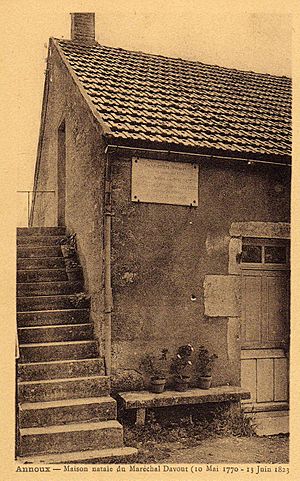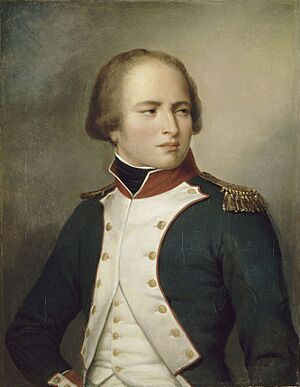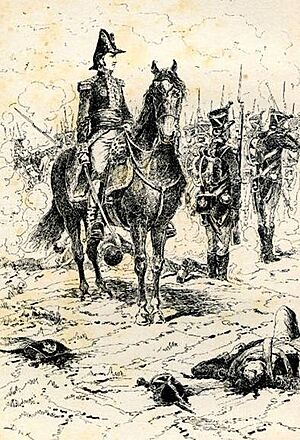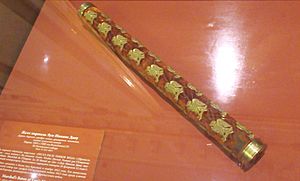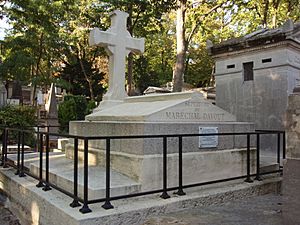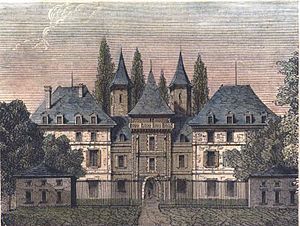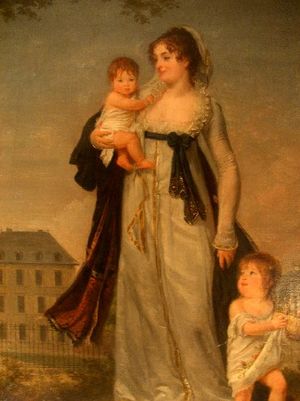Louis-Nicolas Davout facts for kids
Quick facts for kids
Marshal of the Empire
Louis-Nicolas Davout
Duke of Auerstedt, Prince of Eckmühl
|
|
|---|---|
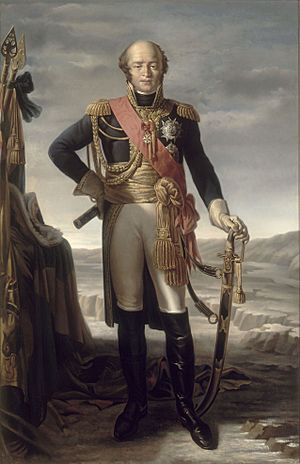
Portrait of Davout after an original by Claude Gautherot
|
|
| Minister of War of the French Empire | |
| In office 20 March 1815 – 9 July 1815 |
|
| Monarch | Napoleon I Napoleon II |
| Preceded by | Henri Jacques Guillaume Clarke |
| Succeeded by | Laurent de Gouvion Saint-Cyr |
| Governor-general of the Duchy of Warsaw | |
| In office 15 July 1807 – 1809 |
|
| Mayor of Savigny-sur-Orge | |
| In office 8 October 1822 – 1 June 1823 |
|
| Personal details | |
| Born | 10 May 1770 Annoux, Champagne |
| Died | 1 June 1823 (aged 53) Paris, Seine |
| Resting place | Père Lachaise Cemetery, Paris |
| Children | 8 |
| Awards | Legion of Honour |
| Signature |  |
| Nickname | The Iron Marshal |
| Military service | |
| Allegiance | |
| Branch/service | Army |
| Years of service | 1788–1815 |
| Rank | Marshal of the Empire |
| Commands |
|
| Battles/wars |
See battles
|
Louis-Nicolas d'Avout (born May 10, 1770 – died June 1, 1823) was a famous French military leader. He was known as Davout and was given the titles of 1st Duke of Auerstedt and 1st Prince of Eckmühl. He served during both the French Revolutionary Wars and the Napoleonic Wars.
Davout was a very skilled commander and a strict leader. This earned him the nickname "The Iron Marshal" (Le Maréchal de fer). Many people, including Napoleon, thought he was one of the best military leaders of his time. Davout was always loyal to Napoleon. His name is even spelled "Davoust" on the famous Arc de Triomphe in Paris.
Contents
Louis-Nicolas Davout: The Iron Marshal
Early Life and Military Start
Louis-Nicolas Davout was born in a small village called Annoux in France. He came from a noble family, but they were not rich. He went to a military school in Brienne-le-Château, which Napoleon also attended. Later, he went to the École Militaire in Paris.
He finished his military training in 1788. He became a junior officer in a cavalry regiment. When the French Revolution began, Davout supported its ideas. He quickly rose in rank and showed his bravery in battles like the Battle of Neerwinden (1793) in 1793.
Rising Through the Ranks
After some time, Davout joined Napoleon Bonaparte's army in the French campaign in Egypt and Syria. When he returned to France, Napoleon recognized his talent. Napoleon promoted him to general and arranged for him to marry Aimée Leclerc, who was related to Napoleon's family.
In 1804, when Napoleon became emperor, Davout was named one of the first 18 Marshals of the Empire. He was the youngest and least experienced of these generals. This made some other generals dislike him.
Key Battles and Victories
Davout led the III Corps of Napoleon's army, known as the Grande Armée. This is where he showed his greatest skills. At the Battle of Austerlitz in 1805, his corps marched for 48 hours. They then bravely faced a strong attack from the Russian army.
In 1806, Davout achieved a famous victory at the Battle of Auerstädt. He led only 28,000 soldiers against the main Prussian army, which had more than twice as many troops (over 63,000). Despite being outnumbered, Davout won the battle. As a reward, Napoleon allowed Davout and his soldiers to be the first to enter Berlin.
Davout also proved himself in other major battles, including Eylau and Friedland. After these victories, Napoleon made him the governor-general of the new Grand Duchy of Warsaw in 1807. The next year, he was given the title of Duke of Auerstädt.
In 1809, Davout fought in the Battle of Eckmühl and played a key role in the Battle of Wagram. After this campaign, he was given the title of Prince of Eckmühl.
Serving Napoleon
In 1812, Napoleon trusted Davout to organize a huge army for the invasion of Russia. Davout commanded the I Corps, which was the strongest part of the army with over 70,000 soldiers.
The Russian Campaign
During the Russian campaign, Davout's corps fought in several battles, including Mohilev and Battle of Smolensk (1812). He continued with the main army through the campaign. During the difficult retreat from Moscow, Davout was in charge of the rear guard. This was a very tough job.
He lost his marshal's baton during the retreat. This made Napoleon unhappy with him. Davout did not meet with the emperor again until Napoleon returned from his exile on Elba.
Defending Hamburg
In 1813, Davout was put in charge of the city of Hamburg. He defended the city during a long Siege of Hamburg. He only surrendered when King Louis XVIII ordered him to, after Napoleon had given up his throne in 1814. Davout was a strict leader who expected his soldiers to follow rules exactly. He was known for being tough, but this also meant his army corps was very reliable. For example, he didn't allow his soldiers to steal from villages.

After Napoleon's Fall
When the Bourbon monarchy returned to power, Davout retired. He did not hide his dislike for the Bourbons. When Napoleon returned from Elba for the "Hundred Days," Davout immediately rejoined him.
Napoleon made Davout his Minister of War. Davout worked hard to reorganize the French Army. He was so important to the war effort that Napoleon kept him in Paris during the Waterloo campaign. Many historians wonder if Davout's presence on the battlefield might have changed the outcome of the war.
Davout led the defense of Paris after the Battle of Waterloo. He was ready to fight, but the government ordered him to negotiate with the enemy instead. Napoleon later said that Davout loved France more than he loved Napoleon personally. After Napoleon's final defeat, Davout submitted to the restored Bourbon monarchy. He was briefly exiled and lost his titles.
However, the Bourbons eventually changed their minds about Davout. In 1817, his rank and titles were given back to him. In 1819, he became a member of the French Parliament, called the Chamber of Peers.
In 1822, Davout was elected mayor of Savigny-sur-Orge. He held this position for one year. His son, Louis-Napoléon, also became mayor of the city later. A main square and a boulevard in Paris are named after them.
Davout passed away on June 1, 1823. He is buried in the Père Lachaise Cemetery in Paris.
Personal Life and Character
Davout was known for being very organized in both his military and personal life. He was often seen as serious and distant by others. While people respected him, he wasn't always well-liked. When he wasn't fighting, he preferred to spend time with his family at home.
Because of his strong personality, he had some disagreements with other officers. He especially had a strong dislike for Jean-Baptiste Bernadotte. Davout believed Bernadotte had not helped him enough at the Battle of Auerstädt. He even wanted to fight a duel with Bernadotte, but Napoleon stopped them.
Davout got along best with Marshals like Michel Ney and Nicolas Charles Oudinot. His closest friend was Charles-Étienne Gudin de La Sablonnière, who was one of his officers.
Family Life
Davout was very loyal to his second wife, Louise Aimée Julie Leclerc. They married in 1801 and stayed together until his death. Their marriage was a loving one, and they remained faithful to each other even during long periods apart.
They had eight children together, but four of them sadly died when they were very young. Their youngest daughter, Adelaide-Louise, later arranged for a lighthouse to be named after her father. The Phare d'Eckmühl in Brittany, France, was opened in 1897 in his honor.
Honours and Awards
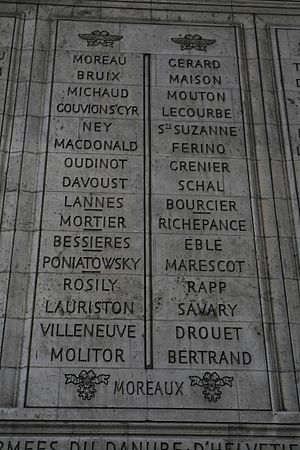
Davout received many important honors and awards during his life, including:
- Knight Grand Cross of the Order of the Legion of Honour
- Knight of the Order of the Iron Crown
- Grand Cross and Star of the Virtuti Militari
- Knight Grand Cross of the Order of the White Eagle
- Knight of the Order of Christ
- Knight Grand Cross of the Military Order of St. Henry
- Knight Grand Cross of the Military Order of Max Joseph
- Knight Grand Cross of the Royal Order of St. Stephen of Hungary
- Knight of the Military Order of Maria Theresa
- Knight Grand Cross of the Order of the Elephant
See also
 In Spanish: Louis Nicolas Davout para niños
In Spanish: Louis Nicolas Davout para niños
 | Delilah Pierce |
 | Gordon Parks |
 | Augusta Savage |
 | Charles Ethan Porter |


